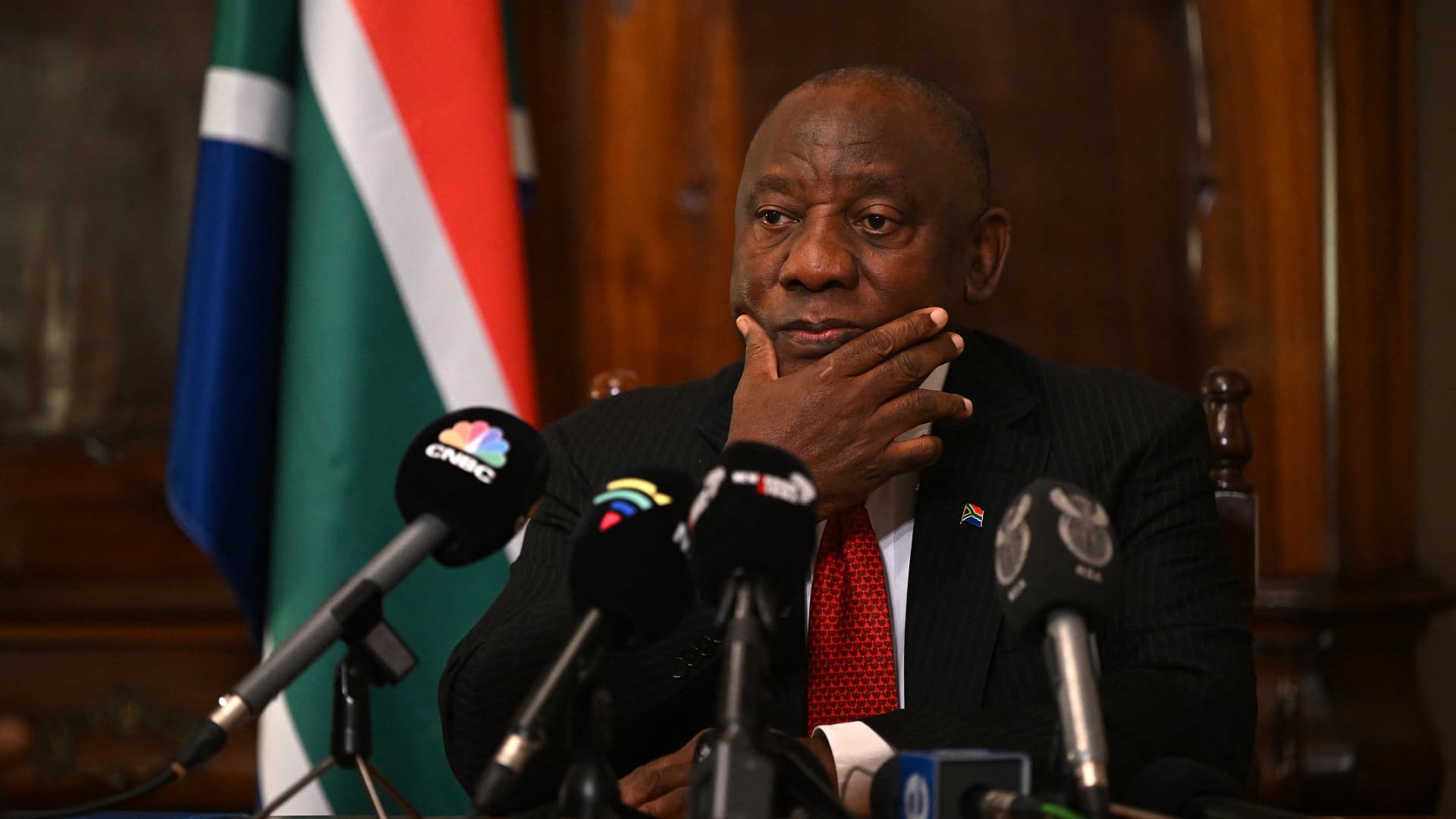After years of stagnation, South Africa’s economy is about to take off. That is in jeopardy with this week’s election.
For the first time since Nelson Mandela brought the African National Congress to office in 1994 and ended White minority rule, opinion polls indicate that the party could lose its national majority on Wednesday.
The ANC has lost support as a result of corruption and poor administration during its tenure. However, since President Cyril Ramaphosa took office in 2018, the party has been on a cautious pro-growth path. The Wall Street Economics states that keeping him in power will be best for investors.
After years of stagnation, South Africa’s economy is about to take off. That is in jeopardy with this week’s election.
That’s just what some investors are betting will happen, which has caused the rand to surge recently.
As Reported by Bloomberg – The majority of emerging-market experts were either neutral or overweight about the nation, indicating hope that a post-election populist shift will be avoided.
Analysts predict that the gradual implementation of Ramaphosa’s policies will contribute to the economy growing by 1.1% this year, up from a pitiful 0.6% in 2023 and even more in 2025.
That may not seem like much, but if he does poorly in the polls, things might get much worse. A few surveys have revealed that the ANC’s support is less than 40%.
The ANC will be forced into a coalition administration if its share of votes falls below 50%. Remaining just below that line probably implies allying with a lesser adversary who will support Ramaphosa’s plans.
Greater losses, however, would drive it into an agreement with one of the major opposition parties, and some of those choices seem quite unsettling to international investors.
They include the pro-business Democratic Alliance under John Steenhuisen, the radical Julius Malema-led Economic Freedom Fighters, and the uMkhonto weSizwe Party of former President Jacob Zuma.
The last two seek to expropriate land without just compensation and nationalize the central bank.
“Foreign investment would be very cautious to invest into the country, certainly until they’ve seen the roadmap of policy,” Nedgroup Investments’ head of multi-management, Trevor Garvin, stated.
The investors’ top goal would be to form an ANC-DA collaboration.
To prevent what it calls the “doomsday scenario” of an ANCEFF administration, the DA hasn’t completely ruled out the prospect of one, but neither has caved in on the concept just yet.
Some are hesitant because they don’t know if there will be a significant shift to the left following the election,
or if things will stay the same. Businesses were amassing cash at a rate twice as fast as inflation prior to the elections, and foreign investors were still net sellers of stocks.
Kevin Lings, head economist at Stanlib Asset Management Ltd., forecasts that the business will do nothin.
That degree of uncertainty might last for a few years. months. Maybe a year.
Users using Bloomberg Terminal can click on ELEC ZA to obtain more information about the elections in South Africa.
This kind of stoppage could prove costly at a time when development in South Africa is just starting to level off.
According to Reuters, “Business tends to hold back on a lot of things, but they don’t want to feel like they are losing out if things start to go well.” But in the face of coalition uncertainty, businesses won’t invest, saying “That’s a lost opportunity.”
Economics looked at the potential results of the election and the implications for the policy and economy:
ANC Preserves Majority Vote and Maintains Policy
Though opinion surveys don’t seem to support it, if voters stick with the ANC and the opposition splits, the party may yet be able to hold onto its majority.
Policy direction:
In this scenario there would be little policy change:
- With unemployment running at 32.9%, job creation via public works programs will remain a key ANC goal.
- Growth through industrialization is another ANC objective and it will keep pursuing broader economic ownership to reduce the nation’s gaping levels of inequality.
- Land reform to redress the historic injustices of White-minority rule will also stay on the front burner.
Economic impact:
- Growth will likely pick up from around 1% in 2024 to 1.7% in 2026, falling short of the country’s 2% long-term average because of interest rates at a 15-year high, power outages, and low investment outside of the energy sector. Looking further out, growth may rise above 2% as ongoing reforms in sectors such as power and logistics begin to bear fruit.
- Inflation will remain sticky until year-end, holding above the 4.5% midpoint of the central bank’s target band. This will likely delay rate cuts until late 2024.
- The rand has made significant gains against the dollar since the end of April. Further advances are likely in the event of an ANC majority because South African assets look cheap, rates are high and an ANC win would calm the market by signaling policy continuity.
As reported by The Africa Election Report
ANC Expedited Policy Implementation with 40 49% of VotesWith its share of the national vote falling from 69.7% in 2004 to 57.5% in 2019 and 45.6% in the local government elections of 2021, the African National Alliance (ANC) has experienced a consistent reduction in support.
This is the most likely outcome of Wednesday’s vote, according to the trend, which means it will have to create an alliance with one or two minor opposition parties, most likely the Inkatha Freedom Party.
Policy direction:
- Policy changes are unlikely in this scenario because the ANC will be able to pick a partner that shares a similar vision. The IFP looks like the most natural fit.
- Small coalition partners will serve as an internal check within the government but won’t push for major strategic shifts. That could deliver faster policy implementation and limit corruption.
- The IFP’s manifesto suggests the party will likely seek an increase in social grants and free basic education, bringing pressure to bear on public spending and debt issuance.
Economic impact:
- Faster implementation of reforms will support a brisker pick-up in growth to 2% over the medium term. Government spending on health and education will likely increase. Higher social spending will be mitigated by less public sector waste and stronger tax revenue.
- The rand is likely to initially falter on news the ANC has lost its majority. But the formation of an ANC-IFP government in the following days calms markets, triggering a rebound. That will help to keep inflation heading lower, supporting a rate cut sooner rather than later.
ANC’s Vote Is Less Than 40%, Pragmatism in Policy
An alliance with the EFF or the DA is more likely if the ANC vote percentage drops below 40%. Based on polls, the EFF’s vote is still being trailed by Zuma’s MKP, so if the ANC moves to the left, it will probably go toward Malema rather than its former leader.
Direction of policy:
Because of their closer policy differences and the likelihood that the EFF will demand a seat as finance minister or deputy president, the ANC is more likely to form a coalition with the DA than the EFF.
A debt ceiling, tax reform that benefits investors and businesses, and the relaxation of onerous labour regulations to encourage hiring are among the top priorities of the Democratic Alliance.
To enhance public service delivery, it also seeks to outlaw the practice of the ruling party assigning its members to important government positions through civil-service cadre appointments.
Economic impact:
- Investment would increase with an ANCDA partnership, promoting faster growth and employment creation.
- However, as the junior member in the coalition, the DA would find it difficult to advocate for meaningful policy change, so gains would be constrained.
- Over the coming years, debt is expected to stabilize thanks in part to the DA’s emphasis on tighter budgetary controls.
- A party in government that is friendly to business will strengthen the rand and promote lower rates and moderate inflation.
Should the ANC and EFF form a government, the communist party will expedite current employment and land reform programs in order to advocate for more economic ownership.
At first, this depresses investor mood. However, previous instances of leftist advancement in Latin America imply that their leaders tend to become more realistic after winning office and to temper their rhetoric
As this becomes evident, a similar turn by the EFF is probably in order to indicate that the rand will retreat following the installation of an ANC-EFF government.
Rate reductions might not occur until late 2025, assuming price stability is regained. For the ensuing years, growth stays moderate, at around 2%. Government borrowing remains high in order to fund work initiatives that generate jobs, postponing debt stabilization as a percentage of the economy into the next decade.
Read more
Tesla: Rejecting Musk’s $56 Billion What Shareholders Need to Know

Andrew is a New York-based markets reporter at The Wall Street , covering the latest news from Wall Street, the rise of the spot bitcoin exchange-traded funds and updates on crypto markets. He is a graduate of New York University’s business and economic reporting program and has appeared on CBS News, YahooFinance and Nasdaq TradeTalks. He holds BTC and ETH.







